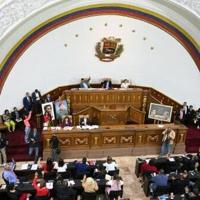Brazil’s president on Thursday urged Venezuelan President Nicolas Maduro to consider holding new elections after international condemnation of last month’s vote the opposition says the strongman stole.
If Maduro “is sensible,” said Brazilian President Luiz Inacio Lula da Silva, “he could try to appeal to the people of Venezuela, perhaps even organize elections.”
Lula told a Brazilian radio station that prior to a new election, Maduro should “establish criteria for participation of all candidates” and “allow observers from all over the world.”
Venezuela’s CNE electoral council proclaimed Maduro the winner of a third, six-year term with 52 percent of votes cast in a July 28 poll without providing a detailed breakdown of the results.
The opposition says it has access to 80 percent of polling-station-level results which show that Edmundo Gonzalez Urrutia, a 74-year-old retired diplomat, defeated Maduro by a wide margin.
Gonzalez Urrutia and wildly popular opposition leader Maria Corina Machado, who was barred from running by Maduro-friendly state institutions, have been in hiding since the president accused them of seeking to foment a “coup d’etat” and demanded they be jailed.
Anti-Maduro protests have claimed 25 lives so far, with dozens injured and more than 2,400 arrested.
Maduro’s victory claim has been rejected by the United States, European Union and several Latin American countries.
Lula said Wednesday he had spoken to his Colombian counterpart Gustavo Petro by telephone about a possible “political exit” from Venezuela’s post-election crisis.
– Parliamentary offensive –
Maduro, a political ally of leftist Lula, has previously rejected the possibility of new elections and has asked the country’s highest court, also viewed as loyal to him, to certify the outcome.
Lula said Thursday he does “not yet” recognize the CNE results.

Venezuela’s parliament, meanwhile, will continue Thursday considering a slew of new laws critics say are meant to criminalize Maduro’s opponents.
The measures would tighten regulations on the registration and funding of non-governmental organizations, which the regime has described as a “facade for the financing of terrorist actions.”
National Assembly president Jorge Rodriguez has indicated he would also seek to ban future election observation missions from foreign countries.
Other legislative measures seek to increase government oversight over social media and to punish “fascism” — a term often used by Maduro to tar critics.
The socialist president says social media is being used to attack him and to promote “hate,” “fascism” and “division.”
Last week, he banned social media site X for 10 days after CEO Elon Musk said Maduro had engaged in “major election fraud.” The president has also promoted a boycott against WhatsApp.
The vast majority of 277 lawmakers in the single-chamber legislature are loyal to Maduro, who had warned of a “bloodbath” if he lost his reelection bid.
United Nations human rights chief Volker Turk and the Inter-American Commission on Human Rights have urged lawmakers not to pass laws they said would limit democratic freedoms.
Since coming to power in 2013, Maduro has overseen an economic collapse that has seen more than seven million Venezuelans flee the country, as GDP plunged 80 percent in a decade.
His re-election in 2018 was also rejected as a sham by dozens of countries.
Machado has called for protests in Venezuela and worldwide on Saturday.
Source link : http://www.bing.com/news/apiclick.aspx?ref=FexRss&aid=&tid=66be5a396b5a4d68b8f0ca72f677a8e8&url=https%3A%2F%2Fwww.kpcnews.com%2Fnews%2Fnational%2Farticle_d025a9e3-e173-5df1-894d-edfaceb5dfa0.html&c=818489821705304097&mkt=en-us
Author :
Publish date : 2024-08-15 04:59:00
Copyright for syndicated content belongs to the linked Source.








